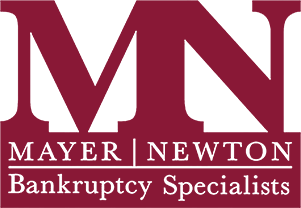Debunking Myths About Chapter 13 Bankruptcy
Myth: Chapter 13 Bankruptcy is a Sign of Financial Failure
It's a common misconception that filing for Chapter 13 bankruptcy signifies financial failure. However, this couldn't be further from the truth. In reality, Chapter 13 bankruptcy is a tool designed to help individuals regain control of their financial situation. It's a structured method for repaying debts over a period of time, allowing debtors to manage their obligations without the constant pressure from creditors. It's not a sign of failure, but rather a step towards financial recovery and stability.
Bankruptcy laws exist to provide relief to those who find themselves unable to meet their financial obligations due to various circumstances, such as job loss, medical emergencies, or unexpected expenses. The stigma attached to bankruptcy often discourages people from seeking the help they need. Remember, filing for Chapter 13 bankruptcy in Knoxville, TN, is not an admission of defeat, but a strategic move towards financial freedom.
Myth: Chapter 13 Bankruptcy Ruins Your Credit Forever
Another prevalent myth is that filing for Chapter 13 bankruptcy will permanently ruin your credit. While it's true that bankruptcy will have a significant impact on your credit score initially, it's not a life sentence. Over time, the negative effect of bankruptcy on your credit score decreases, and it's entirely possible to rebuild your credit post-bankruptcy.
Bankruptcy information stays on your credit report for seven to ten years, but its impact lessens with time. By maintaining consistent, on-time payments on your remaining debts and any new credit, you can start to rebuild your credit score. In fact, some lenders view borrowers post-bankruptcy as less of a risk because they have fewer outstanding debts. Therefore, Chapter 13 bankruptcy doesn't spell the end for your credit; it can be the beginning of a more manageable financial situation.
Understanding the Process of Chapter 13 Bankruptcy
The Role of the Bankruptcy Trustee in Chapter 13
In a Chapter 13 bankruptcy case, the bankruptcy trustee plays a crucial role. The trustee is an impartial third party appointed by the court to oversee the case. Their primary responsibilities include reviewing the debtor's financial affairs, confirming the accuracy of the repayment plan, and distributing payments to creditors as per the plan. The trustee ensures that the debtor complies with their obligations and that the creditors receive their due share.
The trustee also provides information to parties involved, answers inquiries, and ensures transparency throughout the process. They act as the mediator between the debtor and the creditors, facilitating communication and resolving disputes. Understanding the role of the trustee can help demystify the Chapter 13 bankruptcy process for those considering this option in Knoxville, TN.
The Chapter 13 Bankruptcy Repayment Plan
The cornerstone of a Chapter 13 bankruptcy case is the repayment plan. This plan, usually spread over three to five years, outlines how the debtor will pay off their debts. The repayment plan is based on the debtor's income, expenses, and types of debt. It's designed to allow the debtor to repay their obligations in a manageable way, without sacrificing necessary living expenses.
The repayment plan must be approved by the bankruptcy court and is binding on all parties. It provides a structured way for debtors to regain control of their finances while offering creditors a fair method of debt recovery. Understanding the repayment plan is crucial for anyone considering Chapter 13 bankruptcy in Knoxville, TN.
The Impact of Chapter 13 Bankruptcy on Personal Finances
Chapter 13 Bankruptcy and Home Ownership
One of the significant advantages of Chapter 13 bankruptcy is its impact on home ownership. Unlike Chapter 7 bankruptcy, which may require the liquidation of assets, Chapter 13 allows debtors to keep their property, including their homes. This is particularly beneficial for individuals who are behind on their mortgage payments.
Chapter 13 bankruptcy can halt foreclosure proceedings and provide a debtor with the opportunity to catch up on missed payments through the repayment plan. This protection can provide much-needed peace of mind for homeowners in Knoxville, TN, who are struggling with their finances.
Chapter 13 Bankruptcy and Future Loans
While Chapter 13 bankruptcy does impact your ability to obtain future loans, it doesn't completely bar you from borrowing. Lenders may see you as a higher risk immediately after bankruptcy, and you may face higher interest rates or stricter loan terms. However, as time passes and you demonstrate financial responsibility, lenders' willingness to extend credit can improve.
Moreover, certain types of loans, such as FHA or VA home loans, may be available to individuals after a shorter waiting period post-bankruptcy. It's essential to approach borrowing cautiously after bankruptcy, ensuring that you can comfortably manage any new debt.
Legal Aspects of Chapter 13 Bankruptcy
The Automatic Stay in Chapter 13 Bankruptcy
One of the immediate benefits of filing for Chapter 13 bankruptcy is the automatic stay. This provision prevents creditors from taking collection actions against the debtor. This means that once you file for bankruptcy, creditors cannot sue you, garnish your wages, or even contact you regarding your debt.
The automatic stay can provide immediate relief to individuals dealing with constant calls and letters from creditors. It also allows debtors the breathing room to organize their finances and focus on their repayment plans. The automatic stay is a powerful tool for debtors in Knoxville, TN, providing them with the protection they need to regain their financial footing.
Dischargeable and Non-dischargeable Debts in Chapter 13 Bankruptcy
In a Chapter 13 bankruptcy, certain debts are dischargeable, meaning they can be wiped out at the end of the bankruptcy process. These typically include credit card debt, medical bills, and personal loans. However, some debts are non-dischargeable, such as student loans, child support, and certain tax obligations.
Understanding the difference between dischargeable and non-dischargeable debts is crucial when considering bankruptcy. It can help you assess the potential benefits of filing for Chapter 13 and guide your financial planning during and after the bankruptcy process.
Life After Chapter 13 Bankruptcy
Rebuilding Credit After Chapter 13 Bankruptcy
Rebuilding your credit after Chapter 13 bankruptcy is not only possible, but it's also a crucial part of your financial recovery. By making timely payments on your repayment plan and any new credit, you can start to improve your credit score. Additionally, adopting responsible financial habits, such as budgeting and saving, can also positively impact your credit.
Remember, rebuilding credit takes time and patience. It's not an overnight process, but with consistent effort, you can see significant improvements. The journey to credit recovery post-bankruptcy may seem daunting, but with the right guidance and resources, it's entirely achievable.
Financial Management Post Chapter 13 Bankruptcy
Effective financial management is crucial after Chapter 13 bankruptcy. This includes creating and sticking to a budget, building an emergency fund, and planning for future financial goals. These habits can help prevent future financial difficulties and set you on a path toward financial stability.
Bankruptcy can serve as a financial reset, providing you with the opportunity to reassess your financial habits and make necessary changes. With careful planning and disciplined execution, you can regain control of your finances and build a secure financial future.
If you're considering filing for Chapter 13 bankruptcy in Knoxville, TN, or if you're already in the process, the Law Offices Of Mayer & Newton are here to help. Our experienced team can guide you through the process, debunk any myths, and provide you with the resources you need to navigate life during and after bankruptcy. Don't let financial stress control your life. Contact us today to take the first step towards financial freedom.
Call The Law Offices Of Mayer & Newton now at (865) 328-7993 or send us a message online.


